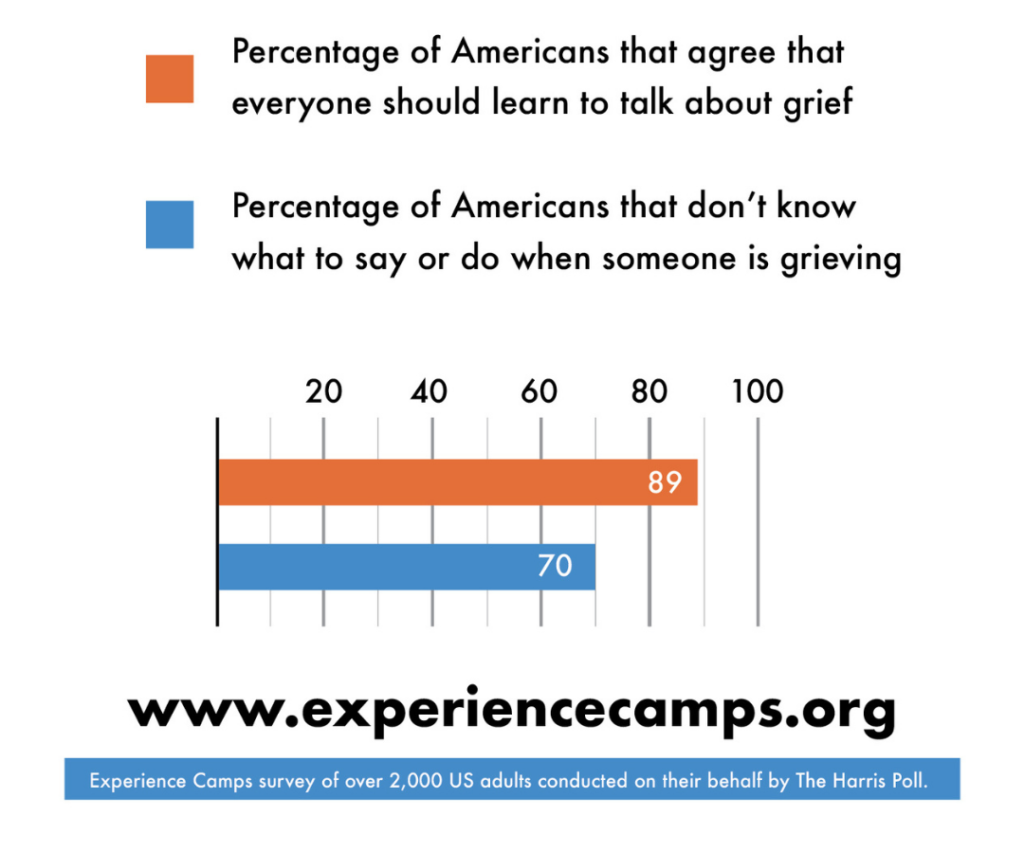Here at Experience Camps, we wanted to know how Americans feel currently about grief. Specifically, do we as a society think it’s important to talk openly about it? Do we believe we’re good at supporting those who are grieving a death? How is COVID-related grief impacting the way we consider spending the holidays this year? So we recently had The Harris Poll conduct a survey of over 2,000 U.S. adults on our behalf. Below are some of our findings (several of which surprised us), as well as strategies on how we can get better at showing up for those who are grieving. As you’ll see, we have a long way to go.
A whole lot of people would prefer to skip the holiday celebrations this year.
According to the survey, 36% of Americans don’t feel like getting together to celebrate. That number rises to 42% of Gen Z (ages 18-24), 52% of Millennials (ages 25-40), and nearly half (49%) of Hispanic adults. With so much grief surrounding us, due in large part to COVID, it’s not that surprising that so many people are not in the mood to dole out their turkey platters, toast with eggnog, and/or exchange gifts this year.
Grief is an issue of concern nationwide, with 86% of Americans saying it should be addressed as an important mental health issue.
“It’s striking that 89% of Americans agree that everyone should learn to talk about grief, yet 70% don’t have the skills they need, saying they’re often unsure what to do or say when someone they care about is grieving,” said Sara Deren, founder and CEO, Experience Camps. “After more than 520,000 hours with grieving kids, we have a sense of what can help and what generally doesn’t. We encourage everyone to explore our growing video clearinghouse, which provides tangible, real-world ways to go beyond saying ‘I’m sorry for your loss,’ which kids tell us isn’t enough.”

Additional survey findings include:
- Parents of children younger than 18 are markedly more likely than those without kids under 18 (48% vs. 30%) to say they don’t feel like celebrating the holidays due to a sense of grief and loss. “This highlights that the holidays aren’t a joyous time for everyone, and is why we’re sharing tips to help people cope,” said Deren.
- Millennials and Gen Z are far more likely than Baby Boomers (ages 57-75) to say they don’t feel like celebrating the holidays this year due to a sense of grief and loss (52% and 42% vs. 26%). “While many complex factors play into this, it’s notable that both Gen Z and Millennials are more than twice as likely as Boomers (35% each vs. 12%) to say they don’t see a benefit to talking about grief,” Deren observed. “This is among the many insights that warrant additional research.”
- There is a notable racial and ethnic gap, with 49% of Hispanic adults saying they don’t feel like celebrating the holidays due to grief and loss vs. 32% of White non-Hispanic adults. 39% of Black adults agreed.
- Sentiment about grief and the holidays is relatively consistent across regions. 36% in the Northeast, 33% in the South and 38% each in the Midwest and West.
- Midwesterners (74%), Southerners and Westerners (71%) are more likely than those in the Northeast (61%) to say they often don’t know what to say or do when someone they care about is grieving.
- 47% of parents with children under 18 believe children are less impacted by grief after a death than adults are. “In fact, children can be just as affected by grief as adults. If not addressed, grief in childhood can lead to decreased academic performance and mental health issues, substance abuse and suicide – a fact that 89% of Americans consider a significant problem,” Deren said. “Yet, grief is a natural part of life, and the positive news is that it can lead to remarkable resilience.”
So how do we help the 70% of Americans who say they aren’t sure how to support those who are grieving?
For one thing, we talk about grief. “I think grief has an awkward, let’s-not-talk-about-this-at-the-dinner-table stigma around it, when really it’s something everyone will experience in their life,” said Milena, a 16-year-old from Florida who has participated in Experience Camps programs since 2018 and is a member of our Youth Advisory Board. “Keeping your grief to yourself only makes it hurt worse but having open conversations about it with people you feel comfortable with really helps you break your shell and the negative stigma around grief itself. Talking about things like grief allows you to bond with others in a special way, which is always a beautiful feeling and experience.”
Listen (below) to what other young people had to say.
The good news is that there are many ways to show up for kids (and each other) who are grieving. As part of our “Talk about Grief” Campaign, we are educating the public by debunking grief myths, sharing do’s and don’ts when it comes to supporting those who are grieving, and sharing short videos from teens and adults who recount a meaningful action someone did for them after experiencing a loss. The actions are thoughtful but simple, and we can all do them. So let’s make the choice to reach out to others, especially during the holidays, and truly show up for one another. If we do this collectively, we can create a more empathic and supportive culture.
